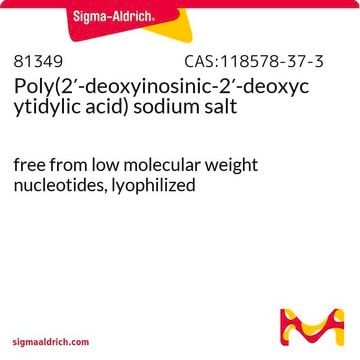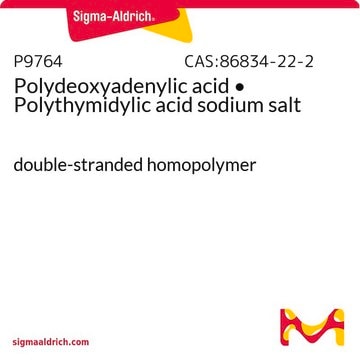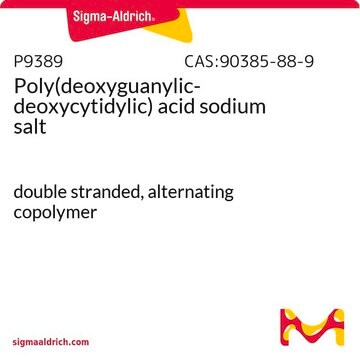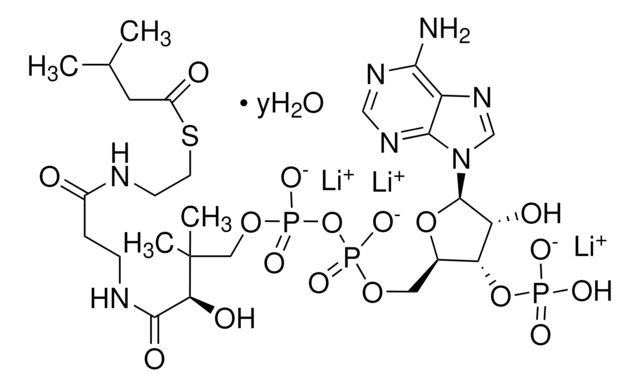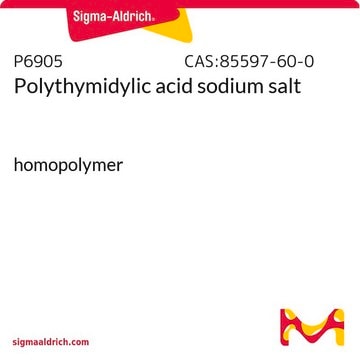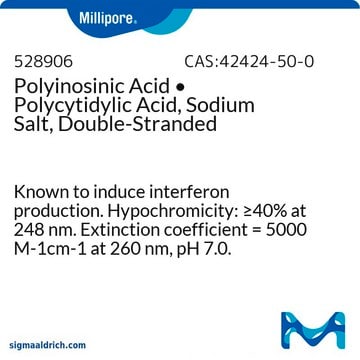P4929
Poly(deoxyinosinic-deoxycytidylic) acid sodium salt
double-stranded alternating copolymer
Sinónimos:
Poly(dI-dC) • Poly(dI-dC) sodium salt
Iniciar sesiónpara Ver la Fijación de precios por contrato y de la organización
About This Item
Productos recomendados
¿Está buscando productos similares? Visita Guía de comparación de productos
Application
Poly(deoxyinosinic-deoxycytidylic) acid (Poly(dI-dC) • Poly(dI-dC)) is an alternating copolymer used as a DNA substrate for evaluation of DNA methytransfeases, such as DNA-methyltransferase 1 and as double-stranded DNA model for conformational studies of DNA structure dynamics and drug, small molecule, interactions.
Poly(deoxyinosinic-deoxycytidylic) acid sodium salt has been used in a study that synthesized and characterized bis(2-(pyrimidin-2-γl)ethoxy)alkanes and their pharmacological activity. Poly(deoxyinosinic-deoxycytidylic) acid sodium salt has also been used in a study that investigated the growth of calcium carbonate films on LB/LbL matrices.
Poly(deoxyinosinic-deoxycytidylic) acid sodium salt has been used in the electrophoretic mobility shift assay in p65 protein and neuro-2A protein lysate. It has also been used as a substrate in the protein arginine methyltransferase 1 (PRMT1) and DNA methyltransferase 1 (DNMT1) selectivity assay.
Biochem/physiol Actions
Poly(2′-deoxyinosinic-2′-deoxycytidylic acid), poly(dI-dC) is a synthetic DNA substrate. At high salt, Poly(dI-dC) exists in left handed helical conformation and reverts to right-handed form upon decreasing salt. It is used in electrophoretic mobility shift assay (EMSA).
Other Notes
Double-stranded alternating copolymer
Unit Definition
One unit will yield an A260 of 1.0 in 1.0 ml of 20 mM sodium phosphate/100 mM NaCl, pH 7.0 (1 cm light path)
Storage Class
11 - Combustible Solids
wgk_germany
WGK 3
flash_point_f
Not applicable
flash_point_c
Not applicable
ppe
Eyeshields, Gloves, type N95 (US)
Elija entre una de las versiones más recientes:
Certificados de análisis (COA)
Lot/Batch Number
¿No ve la versión correcta?
Si necesita una versión concreta, puede buscar un certificado específico por el número de lote.
¿Ya tiene este producto?
Encuentre la documentación para los productos que ha comprado recientemente en la Biblioteca de documentos.
Los clientes también vieron
Dimitrios Priftis et al.
Langmuir : the ACS journal of surfaces and colloids, 28(23), 8721-8729 (2012-05-15)
A systematic study of the interfacial energy (γ) of polypeptide complex coacervates in aqueous solution was performed using a surface forces apparatus (SFA). Poly(L-lysine hydrochloride) (PLys) and poly(L-glutamic acid sodium salt) (PGA) were investigated as a model pair of oppositely
Chao Bi et al.
Plant molecular biology, 94(1-2), 197-213 (2017-04-10)
It has been known that ABA INSENSITIVE 5 (ABI5) plays a vital role in regulating seed germination. In the present study, we showed that inhibition of the catalase activity with 3-amino-1,2,4-triazole (3-AT) inhibits seed germination of Col-0, abi5 mutants and
Meaghan L Clark et al.
Inorganic chemistry, 47(20), 9410-9418 (2008-09-25)
This paper focuses on DNA-binding interactions exhibited by Pt(dma-T)CN(+), where dma-T denotes 4'-dimethylamino-2,2':6',2''-terpyridine, and includes complementary studies of the corresponding pyrr-T complex, where pyrr-T denotes 4'-(N-pyrrolidinyl)-2,2':6',2''-terpyridine. The chromophores are useful for understanding the interesting and rather intricate DNA-binding interactions exhibited
Dexamethasone treatment of calves latently infected with bovine herpesvirus 1 leads to activation of the bICP0 early promoter, in part by the cellular transcription factor C/EBP-alpha
Workman A, et al.
Journal of Virology, 83(17), 8800-8809 (2009)
Identification of Selective, Cell Active Inhibitors of Protein Arginine Methyltransferase 5 through Structure-Based Virtual Screening and Biological Assays
Ye F, et al.
Journal of Chemical Information and Modeling, 58(5), 1066-1073 (2018)
Nuestro equipo de científicos tiene experiencia en todas las áreas de investigación: Ciencias de la vida, Ciencia de los materiales, Síntesis química, Cromatografía, Analítica y muchas otras.
Póngase en contacto con el Servicio técnico
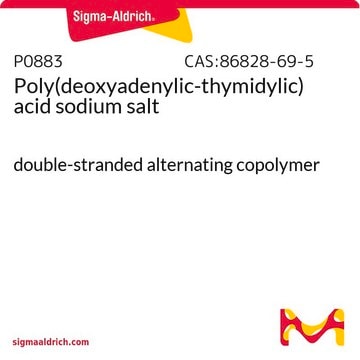
![Poly[d(I-C)] lyophilized, pkg of 10 U (10108812001 [A<sub>260</sub> units]), pkg of 50 U (11219847001 [A<sub>260</sub> units])](/deepweb/assets/sigmaaldrich/product/images/352/091/ef743cea-ccd8-44f1-8f3b-dec5a1e4f5d1/640/ef743cea-ccd8-44f1-8f3b-dec5a1e4f5d1.jpg)
